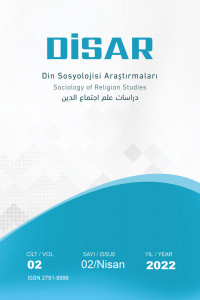Karl Popper and His Struggle Against Logical Positivist in the Context of Falsifiability Theory
The purpose of this study is to better understand Popper's method of falsifiability, based upon Logical Positivists and their methods- Popper was one of them for a period. It aims to examine the inductive method, which is one of the main reasons for Popper's criticism of positivists and the deductive method brought by Popper. Karl Popper (1902-1994) was considered one of the most important science philosophers of the 20th century, made significant contributions to the philo-sophy of science and society. Some of science philosophers supported Popper’s theories, at the same time some of them criticized them fiercely. Despite all, it has attracted the attention of many people in the world of science and philosophy. In our study, we will examine the development pro-cess of logical positivism, which is one of the important movement of thought in that era, and reveal efforts to separate science from metaphysics. We will also examine the logical evidence that Popper brought to the verificationism and try to contribute to the falsification principle that he put forward.
Anahtar Kelimeler:
Karl R. Popper, Inductive, Falsification, Deductive, Verification, Logical Positivism
___
- Bryan Magee, Karl Popper’in Bilim Felsefesi ve Siyaset Kuramı, translation: Mete Tunçay, Şahin Alpay, (Istanbul, Remzi Bookstore, 1990), 18-42.
- Cemal Güzel, Sağduyu Filozofu Popper, (Ankara, Science and Art Publishing, 1998), 7-8.
- Deniz Kurtyılmaz, “Pozitivizmin Doğrulama ve Yanlışlama İlkeleri Ekseninde Modern Bilimin Bilgiyi Metafizikten Arındırma İdeali”, Bülent Ecevit Üniversitesi İlahiyat Fakültesi Dergisi 1 (2018), 24-29. Ekin Erdem, “Karl Popper’in Platon Eleştirisinin Epistomolojik ve Politik Kökenleri”, Anadolu Üniversitesi Sosyal Bilimler Dergisi 3 (2019), 423-436.
- Enis Sınıksaran - Aylin Aktükün, “Karl Popper’ın Yanlışlama Kuralı, Hipotez Testleri ve İktisat”, İstanbul Üniversitesi İktisat Fakültesi Mecmuası 2 (2004), 48-52. Giancarlo Bosetti, “Karl Popper ile Marksizm, özgürlük ve tarihsicilik üzerine…”, Translation: Sinan Gürtunca, Liberal Düşünce Dergisi 33 (2006), 55-65.
- Karl R. Popper, Bilimsel Araştırmanın Mantığı, Translation: İlknur Aka and İbrahim Turan, (İstanbul, YKY, 2020).
- Karl Popper, Bitmeyen Arayış, Translation: Mustafa Acar, (İstanbul: Serbest Yayınları, 2019).
- Karl R. Popper, Tarihselciliğin Sefaleti, Translation: Sabri Orman, (Istanbul, Deli Publications, June (1998).
- Kemal Batak, “Bilim Tümevarım Kaynaklı mıdır ya da Tümevarım Diye Bir Şey Var mıdır? -Karl Popper’ın Tümevarım Eleştirisi”, Marmara Üniversitesi İlahiyat Fakültesi Dergisi 34 (2008) 238-242. Kevin G. Helfenbein - Rob DeSalle, “Falsifications and corroborations: Karl Popper’s influence on systematics”, Moleculer Phylogenetics and Evolution 35 (2005), 271-272.
- Mercan Maden, “Karl Popper’ın Felsefesinde Bilimsel Doğrular ve Yanlışlanabilirlik İlkesi”, Akademi Sosyal Bilimler Dergisi, Sayı:17 (2019), 288-294. Nuriye Merkit, “Karl Popper ve Yanlışlanabilirlik İlkesi”, Birey ve Toplum Sosyal Bilimler Dergisi 1 (2021), 129-143.
- Ömer Demir, Bilim Felsefesi, (İstanbul, Ağaç Publishing House, 1992).
- Özün Çetinkaya, “Karl Popper’ın Yönetiminde Hipotetik-Dedüktif Formun Bilimsel İnşası”, Pamukkale Üniversitesi Sosyal Bilimler Dergisi 19 (2014), 103-119.
- Phil Parvin, “The Rationalist Tradition and The Problem of Induction: Karl Popper’s Rejection of Epistemological Optimism”, History of European Ideas, 37/3 (2012).
- P. Schroeder- Heister, “Popper, Karl Raimund (1902-1994)”, International Encyclopedia of the Social and Behavioral Sciences, ed. NJ Smeser, PB Baltes, (Bergama: Elsevier, 2001). Rahmi Şeyhoğlu, “Açık Toplum ve Karl Raimund Popper”, Türk Akademisi Siyasi Sosyal Stratejik Araştırmalar Vakfı 8 (2014).
- Sercan Kabakçı, “Karl Popper ve Yanlışlamacılığı”, Madde, Diyalektik ve Toplum Dergisi 3 (2019), 187-197.
- Sibel Akgün, “Karl Popper’ın Tarih, Toplum ve Siyaset Felsefesi Üzerine Görüşleri”, FLSF Felsefe ve Sosyla Bilimler Dergisi 7 (2009), 59-76.
- Tuncay İmamoğlu, “Mantıkçı Pozitivizm, Wittgenstein ve Din”, Atatürk Üniversitesi İlahiyat Fakültesi Dergisi 35 (2011), 39-50.
- Başlangıç: 2021
- Yayıncı: Ekonomik Kültürel ve Sosyal Araştırmalar Derneği
